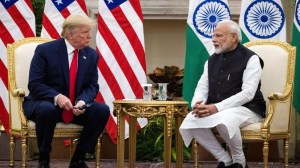Thou shalt not kill, except in a game at church
First the percussive sounds of sniper fire and the thrill of the kill. Then the gospel of peace.

First the percussive sounds of sniper fire and the thrill of the kill. Then the gospel of peace.
Across America, hundreds of ministers and pastors desperate to reach young congregants have drawn concern and criticism through their use of an unusual recruiting tool: the immersive and violent video game 8220;Halo8221;.
The latest iteration of the immensely popular space epic, 8220;Halo 38221;, was released nearly two weeks ago by Microsoft and has already passed 300 million in sales.
Those buying it must be 17 years old, given it is rated M for mature audiences. But that has not prevented leaders at churches and youth centres across Protestant denominations, including evangelical churches that have cautioned against violent entertainment, from holding heavily attended 8220;Halo8221; nights and stocking their centres with multiple game consoles so dozens of teenagers can flock around big-screen televisions and shoot it out.
The alliance of popular culture and evangelism is challenging churches much as bingo games did in the 1960s. And the question fits into a rich debate about how far churches should go to reach young people.
Church leaders who support 8220;Halo8221;8212;despite its 8220;thou shalt kill8221; credo8212;say it has become crucial to evangelistic efforts to reach their most elusive audience, boys and young men, on their home turf.
Witness the basement on a recent Sunday at the Colorado Community Church in the Englewood area of Denver, where Tim Foster, 12, and Chris Graham, 14, sat in front of three TVs, locked in violent virtual combat as they navigated on-screen characters through lethal gun bursts. Tim explained the game8217;s allure: 8220;It8217;s just fun blowing people up.8221;
Once they come for the games, Gregg Barbour, the youth minister of the church said, they will stay for his Christian message. 8220;We want to make it hard for teenagers to go to hell,8221; Barbour wrote in a letter to parents at the church.
But the question arises: What price to appear relevant? Some parents, religious ethicists and pastors say that 8220;Halo8221; may succeed at attracting youths, but that it could have a corroding influence. In providing 8220;Halo,8221; churches are permitting access to adult-themed material that young people cannot buy on their own.
8220;If you want to connect with young teenage boys and drag them into church, free alcohol and pornographic movies would do it,8221; said James Tonkowich, president of the Institute on Religion and Democracy, a nonprofit group that assesses denominational policies. 8220;My own take is you can do better than that.8221;
Daniel R. Heimbach, a professor of Christian ethics at Southeastern Baptist Theological Seminary, believes that churches should reject 8220;Halo,8221; in part because it associates thrill and arousal with killing.
Focus on the Family, a large evangelical organisation, said it was trying to balance the game8217;s violent nature with its popularity and the fact that churches are using it anyway. 8220;Internally, we8217;re still trying to figure out what is our official view on it,8221; said Lisa Anderson, a spokeswoman for the group.
At Sweetwater Baptist Church in Lawrenceville, Ga., Austin Brown, 16, said, 8220;We play 8216;Halo8217;, take a break and have something to eat, and have a lesson,8221; explaining that the pastor tried to draw parallels 8220;between God and the devil8221;.
Players of 8220;Halo 38221; control the fate of Master Chief, a tough Marine armed to the teeth who battles opponents with missiles, lasers, guns that fire spikes, energy blasters and other fantastical weapons. The action is fast and frenetic, the backdrop graphically rich scenes from Earth and outer space.
Complicating the debate over the appropriateness of the game as a church recruiting tool are the plot8217;s apocalyptic and religious overtones. The hero8217;s chief antagonists belong to the Covenant, a fervent religious group that welcomes the destruction of Earth as the path to their ascension.
Microsoft said 8220;Halo 38221; was a 8220;space epic8221; that was not intended to make specific religious references or be more broadly allegorical. Advocates of using the game as a church recruiting tool say the religious overtones are sufficiently cartoonish and largely overlooked by players.
Martial images in literature or movies popular with religious people are not new. The popular 8220;Left Behind8221; series of books8212;it also spawned a video game8212;dealt with the war preceding the second coming of Christ. Playing 8220;Halo8221; is 8220;no different than going on a camping trip,8221; said Kedrick Kenerly, founder of Christian Gamers Online, an Internet site whose central themes are video games and religion. 8220;It8217;s a way to fellowship.8221;
- 01
- 02
- 03
- 04
- 05































